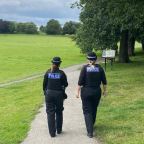
Study explores challenges parents face when choosing schools
The techniques parents use when determining the best secondary school for their children are to be explored in a new study by Plymouth University.
David Carter, Associate Lecturer in the Faculty of Business, is appealing for families across the city to take part in research analysing how they make one of the most important choices relating to their child’s education.
Historically, the primary school a child attended would largely determine which secondary school they went to once they reached the age of 11.
However, a succession of government reforms have aimed to give parents more options, and in the wider Plymouth area there are now almost 20 secondary schools for them to choose from.
Mr Carter said: “Plymouth is very diverse in terms of its secondary school offering, with grammar schools, free schools, academies and other state schools among the options available. But from all those options, parents have to whittle-down their choices to just three, and I am keen to explore what factors they use to do that before choosing the one they most prefer. Locality and exam results may be among the most obvious factors, but often they are not necessarily accurate reflections of a school’s current performance.”
The launch of the study comes at a time when the parents of around 2,600 Year 6 children in primary schools will be contacted by Plymouth City Council and asked to make their top three choices.
The initial questions posed in the online study, which will take around 10 minutes to complete, include whether the family already has a child at their secondary schools of choice as this improves chances of an offer should too many apply for limited places.
It will ask what factors would most influence their decision – including GCSE results, league tables, admissions guides and news articles – and how long they would expect to take in reaching their preferred options.
And it queries what factors and facilities would be essential for a school to either be considered, or ruled out, of the family’s decision-making.
Mr Carter hopes that as well as informing his research, those completing the study may find it a useful tool when considering what makes a school appropriate for their child.
He added: “This is without doubt a complex dynamic process, and the choices reached at the end of it will impact on the whole family, not just the child themselves. Choosing the most local school may for some be the easiest option, but there may be a school further away that is more appropriate but which would create certain difficulties for both the child and their parents. I am also particularly interested in seeing how much parents try to involve their children in, or maybe even shield them from, the pressures of decision making.”
The survey can be accessed through the Plymouth University website, www.plymouth.ac.uk, or directly at http://bit.ly/1PN35LP.











